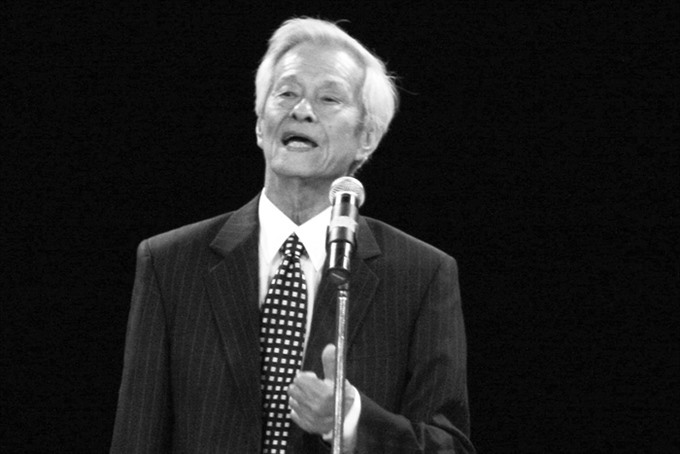[ad_1]
 |
| People’s artist: Film director Huy Thành. Photo tuoitre.vn |
HCM CITY — Award-winning film director Huy Thành passed away while visiting his daughter in France on May 22, at the age of 90.
Director Thành is from the first generation of directors of Vietnamese revolutionary cinema. He is one of two directors to win the Golden Lotus Award three times. He won the award at the 1st Việt Nam National Film Festival in 1970; and again in 1983 and 1985.
“Director Thành was calm and thoughtful. He always respected the creativity of his artistes,” said actor and director Trần Vịnh. He expressed his sorrow to hear about the death of director Thành, whom he regarded as a mentor, and the one who helped him to achieve what he has become today.
Director Thành encouraged Vịnh, who stared out as a theatre actor, to star in films, and later to direct them. Vịnh starred in three award-winning films directed by Thành.
Born in Đà Nẵng in 1928, Thành joined the military in 1945 and moved north after 1954. He studied film directing at the Hà Nội Academy of Theatre and Cinema. His debut was Làng Nổi (Floating Village) in 1965, which he co-directed with Trần Vũ. Later he made two more films and became prominent with the movie Nổi Gió (The Wind Rises).
The movie earned him the Golden Lotus Award for best motion picture at the 1st Việt Nam National Film Festival held in Hà Nội in 1970. The script was written by the director, based on a drama with the same name by author Đào Hồng Cẩm. The movie focused on the families who had children fighting in the American war.
Nổi Gió was the first movie of Vietnamese revolutionary cinema to be shot in the south of the country. It tells of the relationship between two sisters and their younger brother. One sister is a member of the National Liberation Front of South Việt Nam, while her brother is in the Republic of Việt Nam Military Forces.
Theatre actor Thế Anh was chosen for the role of the brother, making him a popular name in Việt Nam at the time. The film is considered a classic of Vietnamese cinema.
Like Nổi Gió, the movie Về Nơi Gió Cát was also about relationships between family members who were on the two frontlines. The movie won the Golden Lotus Award at the 6th film festival in 1983 in HCM City.
The movie Xa và Gần was about Sài Gòn after liberation day on April 30, 1975. It featured a society moving into a new era, drawing focus on the two conflicting ideologies.
Director Thành was a master when featuring the psychology of a mother-in-law and daughter-in-law. The mother-in-law is a representative of the Saigonese middle-class, while the daughter-in-law is an engineer from Hà Nội. The movie appeared in a society where war no longer existed, but also a society filled with contradictions and division.
The movie won the Golden Lotus Award at the 7th film festival in 1985 in Hà Nội.
“He is a master of cinema, and made a great contribution to Vietnamese revolutionary cinema,” said actor Thế Anh who starred in Nổi Gió. “He is always in my heart”.
In honour of his contribution to cinematography, Thành was named a People’s Artist in 1997, and he was given the State Award for Literature and Arts in 2006.
The HCM City Film Association is preparing a memorial ceremony and a funeral, which will be held in HCM City. — VNS
 |
| Award winning: A scene of Nổi Gió by director Huy Thành. Photo youtube.com |
[ad_2]
Source link
